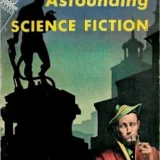Adrian Tchaikovsky is the author of around 50 Science fiction and fantasy novellas including Children of Time, the Shadows of the Apt series, the Final Architecture series, and City of Last Chances. His work has won the Arthur C Clarke, British Science-Fiction, British Fantasy, and Sidewise awards. He is a devoted role-player and keen amateur student of various aspects of zoology and psychology.
If you could have any magical power, but it came with a ridiculous side effect, what would the power be and what would the side effect be?
AT: So the power I’m always after when asked questions like this, is turning into animals. Not only would it be personally fascinating to experience the world through the senses of other creatures, you’re also kind of getting a variety of superpowers for free, given the range of perception and motion that animals encompass. So what’s a good comedy side effect? When I turn into an animal, somewhere in the world an example of that animal spontaneously transforms into a human being, with full cognitive capability and understanding of the human world (that being the human ‘superpower’), but its own memories. The more I use the power, the more the animal world starts to understand just what people are up to and what they do, and eventually the revolution… And now I want to write that book.
If you had to choose between fighting 100 duck-sized robots or one robot-sized duck, which would you pick and why?
AT: So this is one of those questions that just begs more questions. Are these duck-sized robots also the shape and general ambulatory standard as ducks, because (assuming that, being metal, they’re too heavy to actually fly, or indeed swim) I reckon I could end-run around them and just stomp on the outliers until I’d whittled them down to a manageable number. On the other hand, if they’re like spiders, well, I have a great deal of respect for the mobility of the spider and a hundred duck-sized robot spiders would tear a rather unfit human apart pretty quickly. Looking at the other end of the question, of course… what size of robot has this duck been inflated to? Because if it’s a duck the size of a Roomba that’s just… a duck, really. A regular duck. I give myself decent odds in a brutal one-on-one against an actual duck. If it’s a duck the size of some kind of enormous robot factory thing then I’m not sure I’d make much of a dent in its feathers. Although it would also start to suffer very rapid internal collapse and organ failure owing to the operation of the square-cube rule and I could just wait it out. If it was a duck the size of a human-sized robot then I guess I’d give it a go if I could get the jump on it while it was still being surprised about being so big and heavy. (As a sideline go look up Dromornis planei, sometimes reconstructed as a giant predatory duck.)
If you had to choose between being a time traveler or a space explorer, which would you pick and why?
AT: So this is another one where I’d have a whole load of follow-up questions before committing (you can see a theme here). Firstly, being British, I’d ask whether I could add an extra ‘l’ to the word ‘traveler’ because for arcane and pointless reasons we spell it differently. Then I’d ask very much about the technology available for the space exploration option. Laika the dog was technically a space explorer, but I do not particularly want to follow in her paw-prints. Similarly, if I’m passing up the opportunity for time travel then even the best of modern day space tech isn’t really going to cut it. Or, potentially, the best of possible-according-to-physics space tech. I’d need some serious FTL tech and then some facility to actually go and survivably explore a variety of hostile exoplanets or what’s the point? Time travel also comes with a few caveats. None of this ‘just within your lifetime’ business. Also, am I locked to a location when I time travel? Because there’s that old saw about ending up billions of miles out in space because the Earth, the solar system and indeed the whole galaxy are in motion. Also some inbuilt survival capability because you know I’m going to go look at the Cambrian or some other period when the atmosphere isn’t exactly congenial. I’d also need a fairly solid primer on just how the butterfly effect actually worked with causality. Not that it’s a deal changer, but it’s worth knowing if killing grandparents is going to be worth it or not, you know…
Name the strangest/weirdest place you’ve ever written. What made it so odd?
AT: Firstly, I’m interpreting this question as a place that I have invented for one of my books, rather than a place I’ve actually just sat and written, because then it would come down to a choice of airports, trains, and things like that. I’m not one of nature’s great travellers, or even travelers, in person, and so that wouldn’t make for a terrifically interesting answer. So: an interesting bit of tradecraft came out of my thinking about this question. Because you’d think it’d be fantasy, given fantasy isn’t bound by physics, but fantasy is also inherently conservative. Fantasy worlds tend to hearken back to historical periods, and also tend to include a very large proportion of the stuff we had in the real world back then (or at least some facsimile or echo of it). So I could perhaps bring up the cities within lake Limnia in Shadows of the Apt, which are three-dimensional cities within bubbles of air constrained by spider-spun webs deep within a lake. But at the same time they are inhabited by the almost-people kinden of that world, so there’s still a lot of real world commonality going on there (see my novella ‘Cities of Silver’ in the collection For Love of Distant Shores if you want more about this). I think hard SF has some good candidates. I can’t say that much about it, because I’m literally on the point of starting on the book, but my next project has a particularly crazy and inhospitable, yet living, world that is far weirder in its parameters than my fantasy worlds generally get. If I’m limiting myself to places I’ve actually written, though, then let’s go for Criccieth’s Hell, in the second Final Architecture book, Eyes of the Void. This is a world that’s practically rolling about through the upper atmosphere of its star, and has developed an incredibly energetic biosphere of quick-growing plant-like forms that are so powerful radioactive that they basically just ablate away anything they get near. In that universe there’s an elder civilization that has basically tidied away almost all of its relics, but on Criccieth’s Hell there’s still a complete installation of theirs because even they, the mythical god-race of the early universe, couldn’t get near enough to yank it back.
If you were a character in a fantasy RPG, what character class and abilities would you have and how would you level up?
GM: Okay, the king is looking seriously pissed. You’ve got one last chance to win him over before he calls for the guards and this becomes diplomacy critical fumble time.
Paladin: I-
Druid: Would it help if I turned into a spider?
Party: …
Paladin: No, that would not help win over King Othnir the Arachnophobic. Don’t do that.
Druid; What about a jumping spider? I mean, they have big eyes. They’re very cute.
Paladin: No, that –
Rogue: Wait, there are spiders that jump? I did not agree to this.
Mage: I’m preparing Exterminate.
Rogue: I want a promise in writing that you will never turn into one of those.
Druid: What about a really big wasp? People like wasps, right?
Paladin: What is wrong with you?
Mage: I’m preparing Fireball.
Druid: If I can implant some eggs into the king then I could level up. That would help, right?
Rogue: I would backstab you but I don’t want to get within ten feet.
Paladin: Can we please-
Rogue: Lend me your ten-foot pole.
Druid: What about one of those fish lice that eat your tongue and then replace it? Then we could get the king to say anything we liked…
Amongst Adrian’s most recent releases are the portal fantasy gone wrong And Put Away Childish Things, and the last book of the Final Architecture series, Lords of Uncreation.
Kermit is an omnicompetent individual who grew up in a former bawdy house before relocating to his state’s capital city. His family includes many talented artists and an uncle who founded The Church of Bigfoot. He has a passion for storytelling often exploring new ways to engage audiences.








